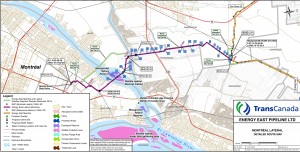Shifts risk to rail through Montreal suburbs
Western Canadian and Northern U.S. crude will have to reach Suncor’s refinery in East End Montreal by rail, if Laval gets its way.
Last week, the mayor of Quebec’s third-largest city Marc Demers came out categorically against construction of the proposed $12 billion Energy East pipeline.
The pipeline route will run north of Montreal and Laval. However, TransCanada, the company that wants to build the pipeline to the Atlantic has filed plans to build a trunk line that will connect its Mascouche pumping station with Montreal’s Suncor refinery.
The Sept. 10 timing of the Demers news conference was odd, since it pre-empted the deadline for TransCanada to reply to the city’s safety concerns. TransCanada met with city officials Aug. 12, to address their concerns.
“We answered whatever questions we could on the spot, and went back to our engineers in an effort to compile more detailed responses to send to [Laval] by Sept. 12,” TransCanada spokesman Tim Duboyce told The Suburban.
“We’re not discouraged in any way,” he added. “We’re here to hear stakeholder concerns and answer their questions about safety and the environment and to respond to those concerns.”
“Our main concern is the safety of our citizens and to protect the environment,” Demers told reporters, “particulars with respect to potential spills into our waterways.”
However, he added that he doesn’t simply object to the short stretch of trunk line that will pass through the eastern tip of Île Jésus. Instead, Demers declared war on the whole transcontinental project, and wants to lead a coalition of municipalities to stop it.
“We have the power to block this pipeline,” Demers declared, “and to force its promoters to retreat.”
He added that his Mouvement lavallois municipal party is ideologically opposed to pipelines.
“Our philosophy is well known, and we believe in it,” Demers explained, “and it doesn’t support fossil fuels.”
Laval’s move will merely shift the risk south though, onto the transcontinental railway main lines that span Montreal’s West Island, inner suburbs and East End. With demand for oil projected to rise during the coming decade, it will also increase Quebec’s dependence on oil from Venezuela, Nigeria and the Middle East.
Last month, a Fraser Institute study concluded that pipelines are 4.5 times safer than rail.
The majority of Quebecers agree.
Public opinion in the province remains solidly behind the safety of pipelines and their potential to boost the province’s energy sector. Popular support for pipelines, particularly among the province’s unionized workers, was an important factor in the former Parti Québécois government’s decision to back another pipeline project, owned by Enbridge Inc, which runs through Laval.
Other pipelines transit Laval as well, including one that has long carried jet fuel to Mirabel and Dorval airports.
Quebec also benefits indirectly from Western Canada’s oil industry. The province receives some $20 billion a year in transfer payments from Canada’s energy-rich provinces.
City wants whole Canada-wide project cancelled, not just little Laval line.
